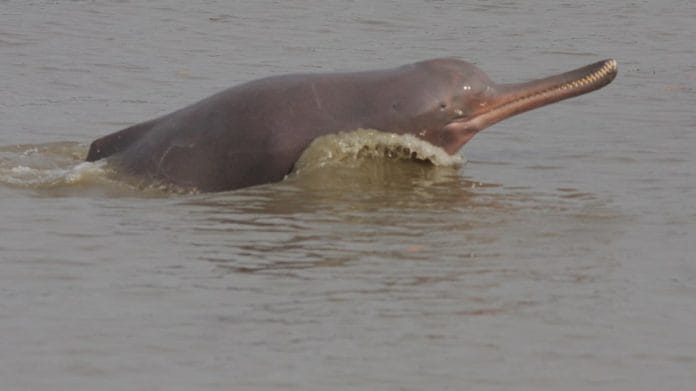New Delhi: Prime Minister Narendra Modi Saturday announced the launch of Project Dolphin to boost the conservation of both river and sea dolphins in India.
“India is committed to protect its biodiversity. We have successfully carried out Project Tiger and Project Elephant,” Modi said, adding that both projects have successfully improved the population of tigers and elephants in the country.
Now, Project Dolphin will focus on both river and sea dolphins, Modi said.
The announcement comes at a time when Bihar and West Bengal, both of which provide habitat to river dolphins, are headed for elections. While Bihar elections are scheduled later this year, West Bengal will go to polls in 2021.
Modi added that the project will boost the biodiversity as well as help provide livelihoods. The project will also help boost tourism, he said.
In a statement shared with the media, the Ministry of Environment and Climate Change said the Project Dolphin will involve conservation of dolphins and the aquatic habitat through use of modern technology, specially in enumeration and anti-poaching activities.
“The project will engage the fishermen and other river/ocean dependent populations and will strive for improving the livelihood of the local communities. The conservation of dolphins will also envisage activities, which will also help in the mitigation of pollution in rivers and in the oceans,” the statement said.
The Ganges river dolphin (Platanista gangetica gangetica) is one of the five river dolphins found in the world. The species is found in the Ganga and Brahmaputra river basins of India, Nepal and Bangladesh. They feed majorly on fish, but are blind.
These dolphins have a highly developed ‘sonar system’ that helps them look for fish even in murky waters. They emit an ultrasonic sound, which reaches the prey. Listening to the sound waves that return, the dolphins form an image in its mind and subsequently catch hold of their prey.
Also read: Online classes now a culture in Covid times, says PM, hails New Education Policy
10-year project
In 2009, the government declared Ganges river dolphin a national aquatic animal. Despite being a protected species under the Wildlife Protection Act, 1972, its numbers had dwindled to under 2,000 over the last century due to indiscriminate fishing, poaching and development of barrages and dams along the habitat of the dolphins.
In India, these dolphins are sighted along deep river reaches in Assam, Bihar, Jharkhand, Madhya Pradesh, Uttar Pradesh and West Bengal.
A number of earlier initiatives have been carried out to protect the species such as the Development of Conservation Action Plan for Dolphins by the Wildlife Institute of India launched in 2016. At present, the ministry pegs the total population of dolphins at about 3,700 in the Indian river systems.
The 10-year ‘Project Gangetic Dolphin’ will involve local populations that are dependent on the river systems to reduce water pollution, encourage sustainable fishery and other livelihood options, said the environment ministry statement.
The project will not only protect dolphins, but will also promote a healthy river ecosystem that is likely to help protect other species in the river.
The project would also work in close tandem and in cooperation and support of various Ministries/Departments/Scientific Organisations/Civil Society Organisations etc. like the Ministry of Jal Shakti, Ministry of Shipping, Ministry of Agriculture and Farmers Welfare, Ministry of Fisheries, Animal Husbandry and Dairy, Ministry of Power, Ministry of Rural Development, state Governments, etc, the statement added.
Also read: India to get new, ‘robust’ cyber security policy soon, says PM Modi






